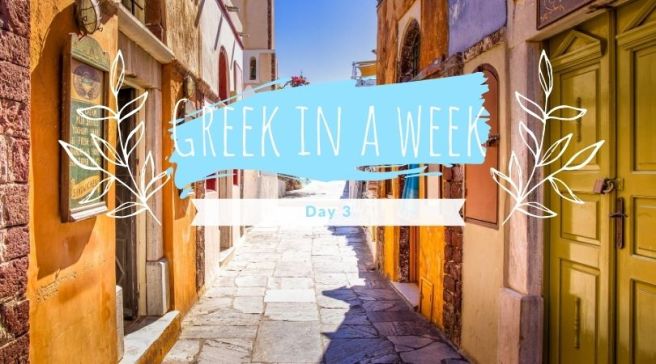
One thing I love about learning a new language is being exposed to music from another country. Spotify makes it so easy to find music from all over the world. This year I’ve been making playlists for the languages I’m learning and use it as a reward. I can only listen to those playlists while I’m studying the related language. My Greek Study playlist already has nearly 20 songs that I love.
My Goal
Today my goal was to continue practicing the alphabet and learn how to say “What languages do you speak?,” “I speak English and Greek,” “I’m American,” and “Now I live in America.”
How I Studied Today
Alphabet – I went through countries in Greek again. I also started using Drops to practice the alphabet. Drops is an app that has you match a word (or letter) with its translation. The free version only provides 5 minutes of use every 10 hours, which works for me because 5 minutes is about how long I like spending on flashcard-like apps.
Pimsleur – I listened to Lesson 2 of Pimsleur again. I felt like this time I had a good handle on it and am ready to move on to the next lesson tomorrow.
Teach Yourself – Todays’ vocabualry is the last set of vocabulary that is in chapter 1. I listened to the dialogues in chapter 1 again and re-read the language notes and grammar sections. Now that I’ve had a little bit of study in Greek, these explanations make a lot more sense! I feel like I can better absorb the information now that I have more context for it.
Duolingo – I started the Greek tree in Duolingo and I hated it. I’ve had very negative experiences with Duolingo trying to teach non-Latin alphabets. The way it’s taught comes across as illogical and haphazard and I can’t imagine trying to do the lessons with no prior knowledge of the Greek alphabet. It’s easiest for me to focus on simple cognates for teaching the alphabet. It would make sense to teach the individual letters and simple cognates to practice putting those letters together into words. Words like φέτα (feta), Ινδία (India), πίτα (pita), and ιδέα (idea) are simple, recognizable, and I think a great way to practice a brand new alphabet. Instead, Duolingo throws out words like δάδα (torch). I agree that δάδα is a very simple word (just two new letters!) but, first, it is a false friend because it looks like “dada” but is very much not. And second, torch? Not a word I’m going to likely use as a Greek newbie and a word that is hard to remember – made even harder because I don’t see any point in trying to memorize it now instead of trying to remember a more useful word like “Greek” or “understand.” I’m going to give Duolingo more chances to win me over, but so far I am just annoyed with it.
What I Learned
-I actually learned this on day 1 but forgot to include it: Greek is a stress language. Therefore stress marks are put above the letter that is stressed. For instance in μαμά (mama), the stress is on the final “a.”
-Greek has three noun genders: masculine, feminine, and neuter (like German!).
